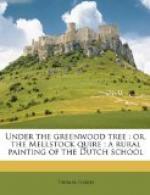The three left the door and paced down Mellstock-lane and across the ewe-lease, bearing under their arms the instruments in faded green-baize bags, and old brown music-books in their hands; Dick continually finding himself in advance of the other two, and the tranter moving on with toes turned outwards to an enormous angle.
At the foot of an incline the church became visible through the north gate, or ‘church hatch,’ as it was called here. Seven agile figures in a clump were observable beyond, which proved to be the choristers waiting; sitting on an altar-tomb to pass the time, and letting their heels dangle against it. The musicians being now in sight, the youthful party scampered off and rattled up the old wooden stairs of the gallery like a regiment of cavalry; the other boys of the parish waiting outside and observing birds, cats, and other creatures till the vicar entered, when they suddenly subsided into sober church-goers, and passed down the aisle with echoing heels.
The gallery of Mellstock Church had a status and sentiment of its own. A stranger there was regarded with a feeling altogether differing from that of the congregation below towards him. Banished from the nave as an intruder whom no originality could make interesting, he was received above as a curiosity that no unfitness could render dull. The gallery, too, looked down upon and knew the habits of the nave to its remotest peculiarity, and had an extensive stock of exclusive information about it; whilst the nave knew nothing of the gallery folk, as gallery folk, beyond their loud-sounding minims and chest notes. Such topics as that the clerk was always chewing tobacco except at the moment of crying amen; that he had a dust-hole in his pew; that during the sermon certain young daughters of the village had left off caring to read anything so mild as the marriage service for some years, and now regularly studied the one which chronologically follows it; that a pair of lovers touched fingers through a knot-hole between their pews in the manner ordained by their great exemplars, Pyramus and Thisbe; that Mrs. Ledlow, the farmer’s wife, counted her money and reckoned her week’s marketing expenses during the first lesson—all news to those below—were stale subjects here.
Old William sat in the centre of the front row, his violoncello between his knees and two singers on each hand. Behind him, on the left, came the treble singers and Dick; and on the right the tranter and the tenors. Farther back was old Mail with the altos and supernumeraries.
But before they had taken their places, and whilst they were standing in a circle at the back of the gallery practising a psalm or two, Dick cast his eyes over his grandfather’s shoulder, and saw the vision of the past night enter the porch-door as methodically as if she had never been a vision at all. A new atmosphere seemed suddenly to be puffed into the ancient edifice by her movement, which made Dick’s body and soul tingle with novel sensations. Directed by Shiner, the churchwarden, she proceeded to the small aisle on the north side of the chancel, a spot now allotted to a throng of Sunday-school girls, and distinctly visible from the gallery-front by looking under the curve of the furthermost arch on that side.




